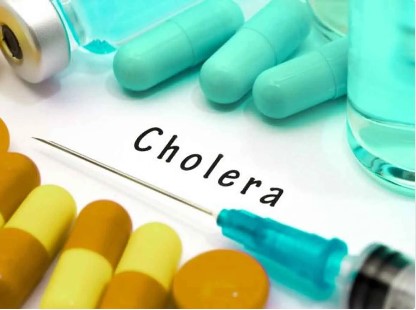
The Rivers State Government has hinted at suspected cases of cholera outbreak in the Ngo community in the Andoni Local Government Area of the state but said no active case has been recorded.
The government, therefore, appealed to the residents of the state to be cautious and access any of the primary healthcare facilities across the state in the event of any health challenge.
The Commissioner for Health, Dr Adaeze Oreh, disclosed this in a voice note sent to newsmen in Port Harcourt, the state capital, on Saturday evening.
She said the information became necessary following recent nationwide reports about cholera outbreaks across some of the states in the country.
Also, the Ekiti State government alerted residents to be on high suspicion for cholera in their communities and the need to take precautionary measures.
The Commissioner for Health, Dr Oyebanji Filani, in a “Public Health Advisory on Cholera,” released on Saturday night, said the outbreak of cholera and the attendant casualty in Lagos State within the geopolitical zone were causes for concern.
The Nigeria Centre for Disease Control and Prevention, in its latest report, warned the public of the increasing trend of cholera cases across the country as the rainy season intensified.
The NCDC said from January 1 to June 11, 2024, a total of 1,141 suspected and 65 confirmed cases of cholera with 30 deaths had been reported from 96 LGAs in 30 states.
Following the report, Adaeze spoke on the status of Rivers State, saying that a notification was obtained on June 9 of some suspected cases of the disease at Ngo town, in the Andoni LGA.
“In the past couple of days, there have been nationwide reports about cholera outbreaks across some of the states in Nigeria.
“I would, therefore, like to share a brief update to the public on the status in Rivers State.
“On the 9th of June, 2024, the Rivers State Public Health Emergency Operation Centre received notification of some suspected cases of cholera at Ngo in the Andoni Local Government Area of the state.
“The Rivers State Public Health Emergency Operation Centre was further notified of two associated deaths in the community with similar symptoms by the local government area rapid response team, led by the state disease surveillance and notification officer.
“The state rapid response team mobilised to support the local government area rapid response team to ascertain the diagnosis, manage and contain the incident.
“Suspected cases were managed at the General Hospital, Ngo and the team interacted with the doctors who were available at the time of the visit.”
She added, “The cholera case management protocol was reviewed for common understanding and the Rivers State Ministry of Health supported the facility with medical consumables, information, education and communication materials, and infection prevention and control commodities.
“I wish to, therefore, emphasise here that there are currently no active cases that have been reported in Rivers State,” she said.
The commissioner, however, advised members of the public to always boil their water before drinking.
The Ekiti health commissioner, on his part, advised residents on hand hygiene, safe water, food safety, vaccination and as well to “use proper toilet facilities and maintain clean sanitation practices.
He also asked them to stay up-to-date with vaccinations against diarrheal diseases, particularly for children.
Filani said, “The state has an operational readiness strategy (based on previous epidemiologic data, risk assessment and identified hotspots) to prevent the outbreak of cholera through the Incident Management System with functional areas/pillars.
“The state has an already established Rapid Response Team at both state and local government areas to actively search for cholera cases. As a result of this, there is heightened surveillance for cholera and other priority diseases across the 16 LGAs in the state,” he said.
Filani described cholera as “a food and water-borne disease, caused by the ingestion of the microorganism Vibrio cholerae in contaminated water and food,” adding that “it is characterised in its most severe form by a sudden onset of acute watery diarrhoea that can lead to death by severe dehydration.”
He advised the public to “wash hands frequently with soap and water, before eating and after using the toilet, ensure access to safe drinking water sources, boil or treat water from questionable sources and as well practice safe food handling, cooking and storage to prevent cholera.”














